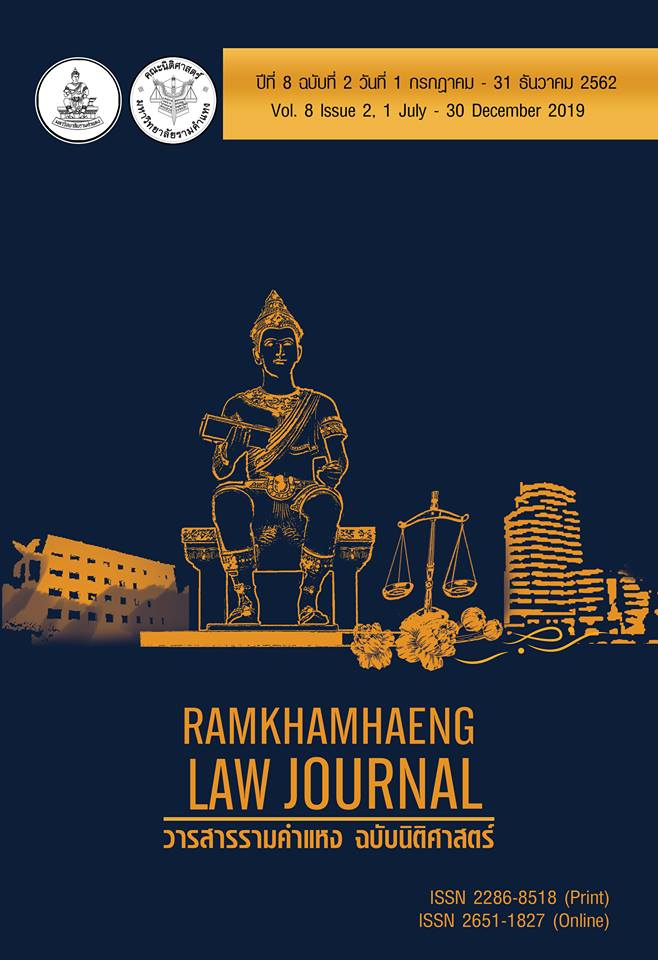ปัญหาการจัดการลิขสิทธิ์ที่เป็นทรัพย์มรดกที่ตกทอดแก่ทายาทโดยธรรม
Main Article Content
Abstract
In this thesis, the researcher examines the historical background, concepts, theories, and legal principles concerning the management of copyright as an inheritance and the management of moral rights as an inheritance by statutory heirs in accordance with the Copyright Act, B.E. 2537 (1994). The researcher also studies organizations collecting copyright charges and the Civil and Commercial Code, Book 6 on inheritance. Furthermore, the researcher proffers guidelines for solving problems concerning the management of copyright as an inheritance for statutory heirs.
Copyright is a type of intellectual property that is special and different from general property, in that is neither movable nor immovable property. It is a type of right that may be used for commercial benefits and may be an assumed right. When the creator or the owner of a copyrighted work dies, the Copyright Act, B.E. 2537 (1994), Section 17, prescribes that the copyright can be inherited as an inheritance. However, there is no provision that covers methods for managing copyrights as inheritance in a specific manner. After the creator or the owner of a copyrighted work dies, the copyrighted work is to be handled in such fashion that it can be shared among heirs. However, at this point, a problem arises regarding the management of copyright as inheritance for statutory heirs.
Findings show that the management of copyright as inheritance for statutory heirs still poses a problem regarding the management of benefits that does not cover the management of rights, especially economic rights in accordance with Section 15, as well as the problem of the management of moral rights in accordance with Section 18 of the Copyright Act, B.E. 2537 (1994). In addition, a problem is found regarding an organization with a purpose to collect copyright charges so as to take care of benefits accruing from the copyrighted work as an inheritance of heirs.
With these problems in view, the researcher proffers the following guidelines to solving problems in the management of copyright. In the view of the researcher, the principle of appointing an administrator of the estate in accordance with the Civil and Criminal Code should be adapted to the management of copyright. The administrator would function as a representative in supervising and managing copyrighted works as inheritance. The organization collecting copyright charges resulting from the use of copyright should take care of the remuneration for copyrighted work through a representative of an administrator.
A Draft Act of An Organization Managing the Collection of Copyright Charges and the Rights of Performers should be mobilized, as well as a Draft Act of the Collection of Copyright Charges and the Rights of Performers. The Chairperson of the Working Committee to draft these laws should be from the Department of Intellectual Property and the spokesperson of the Extraordinary Committee of the National Legislative Assembly. These members of the committee for considering the draft law should inspire confidence in the creator or the copyright, as well as in the heirs who would like to use copyrighted work to reap commercial benefits. As such, the copyright owner and heirs would receive remuneration from the use of the rights in a just and transparent manner that can be verified as falling under the protection of such an Act.
Article Details
References
จิรศักดิ์ รอดจันทร์. ลิขสิทธิ์. กรุงเทพมหานคร: สำนักพิมพ์วิญญูชน, 2555.
ไชยยศ เหมะรัชตะ. คำอธิบายกฎหมายลิขสิทธิ์. พิมพ์ครั้งที่ 4. กรุงเทพมหานคร: สำนักพิมพ์นิติธรรม, 2549.
บัญญัติ สุชีวะ. คำอธิบายกฎหมายลักษณะทรัพย์. พิมพ์ครั้งที่ 10. กรุงเทพมหานคร: สำนักพิมพ์เนติบัณฑิตยสภา, 2550.
ปภาศรี บัวสวรรค์. กฎหมายทรัพย์สินทางปัญญา 1. กรุงเทพมหานคร: สำนักพิมพ์มหาวิทยาลัย-รามคำแหง, 2553.
ประมวลกฎหมายแพ่งและพาณิชย์.
พรชัย สุนทรพันธุ์. คำอธิบายกฎหมายลักษณะมรดก. พิมพ์ครั้งที่ 5. กรุงเทพมหานคร: สำนักอบรมศึกษากฎหมายแห่งเนติบัณฑิตยสภา, 2551.
พินัย ณ นคร. คำอธิบายกฎหมายลักษณะมรดก. พิมพ์ครั้งที่ 3. กรุงเทพมหานคร: สำนักพิมพ์วิญญูชน, 2556
มานิตย์ จุมปา. คำอธิบายประมวลกฎหมายแพ่งและพาณิชย์ว่าด้วยทรัพย์. พิมพ์ครั้งที่ 6. กรุงเทพมหานคร: สำนักพิมพ์จุฬาลงกรณ์มหาวิทยาลัย, 2556.
วีกิพีเดีย. กฎหมายลิขสิทธิ์ฝรั่งเศส [Online]. Available URL: https://en.wikipedia.org/wiki/ Copyright_lawof_France, 2561 (กุมภาพันธ์, 23).
สมหมาย จันทร์เรือง. “ลิขสิทธิ์” ตำรากฎหมายทรัพย์สินทางปัญญา. กรุงเทพมหานคร: เนติบัณฑิตยสภาในพระบรมราชูปถัมภ์, 2555.
อรพรรณ พนัสพัฒนา. คำอธิบายกฎหมายลิขสิทธิ์(ฉบับปรับปรุงใหม่). พิมพ์ครั้งที่ 6. กรุงเทพมหานคร: สำนักพิมพ์แห่งจุฬาลงกรณ์มหาวิทยาลัย, 2557.
อำนาจ เนตยสุภา และชาญชัย อารีวิทยาเลิศ. คำอธิบายกฎหมายลิขสิทธิ์. พิมพ์ครั้งที่ 2.กรุงเทพมหานคร: สำนักพิมพ์วิญญูชน, 2558.
พระราชบัญญัติลิขสิทธิ์ พ.ศ.2537.
Casalonga. Copyright in France [Online]. Available URL: https://www.casalonga.com/ documentation/copyright/copyright-in-france-230/Copyright-inFrance.html?lang=en, 2018 (February, 23).
Copyright, Designs and Patents Act 1988.
Intellectual Property Code.
RCP. กฎหมายลิขสิทธิ์ฝรั่งเศส [Online]. Available URL: https://www.rpc.co.uk/ perspectives/ip/terralex-cross-border-copyright-guide-2018/france/, 2561 (กุมภาพันธ์, 23).

